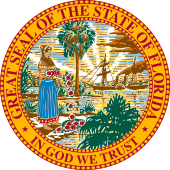User:Gazamp/sandbox11
| Florida Senate Bill 256 | |
|---|---|
 | |
| Florida Legislature | |
| Enacted by | 2023–2024 Florida Legislature |
| Enacted | 9 May 2023 |
| Signed by | Ron DeSantis |
| Introduced by | [[]] |
Florida Senate Bill 256 (SB 256) is a law in the state of Florida which introduced new regulations for employee organizations (labor unions) of public employees.
Provisions
[edit]Membership authorization form
[edit]The legislation introduced a requirement for public employees joining a union to fill out a 'membership authorization form'.[1]: 3 The form is required to include a passage, in 14-point text, outlining that Florida is a right-to-work state and that employees have the right to join, or not to join, a labor union.[1]: 3–4 Membership authorization forms must be kept by the union and be available to the state's Public Employees Relations Commission (PERC) for inspection.[1]: 4–5 [note 1]
Membership resignation
[edit]The legislation allows workers to resign their union membership at any point in the year and prohibits unions from restricting when memberships can be resigned. If the union requires a form to be completed for membership resignations, they must not require the reason for resignation to be disclosed.[1]: 4
Waivers to meet federal funding requirements
[edit]Title 49, Chapter 53 of the United States Code includes labor standards requirements for the use of federal funds for state public transport.[2] SB 256 allows PERC to waive certain Florida law requirements if a public employer is told by the US Department of Labor that its protective agreement with unions may not meet these federal standards, making the employer ineligible for Federal Transit Administration funding.[1]: 5
Dues collection and audit requirements
[edit]The legislation prohibits union dues from being collected by the public employer; workers must instead pay their dues directly to their union.[1]: 6 [note 1] SB 256 also added a requirement for employee organizations to have their annual financial statements audited by a certified public accountant and provided to its members.[1]: 7–8, 12
Registration renewal
[edit]Bargaining unit documentation
[edit]As part of registration renewal applications, unions certified as the bargaining agent for public employees must submit a report on all of its bargaining units.[1]: 9 The report must include information on the size of the bargaining unit, the number of employees in the bargaining unit who are members of the union, the number of employees in the unit who pay and do not pay union dues, and documentation from a certified public accountant which verifies the information.[1]: 9–10 Registration renewals are deemed incomplete if they are not accompanied by this information and unions have ten days to provide missing information before the application is dismissed.[1]: 10 [note 1]
Challenging renewals
[edit]The legislation allowed the public employer or any member of a union's bargaining unit to challenge a union's application to renew its registration if they believe it is inaccurate. The PERC or "one of its designated agents" must then review the accuracy of the application in question.[1]: 11 If it finds that the application is inaccurate, the union's registration and certification is revoked; if the PERC finds that a union failed to co-operate with its investigations or that it intentionally misrepresented information in its application, the union's registration or certification can also be revoked.[1]: 11 [note 1]
Bargaining unit certification
[edit]A union that had less than 60% of the bargaining unit pay dues in its last registration period must apply for recertification as the exclusive representative of the entire bargaining unit within a month of when it applies to renew its registration.[1]: 10–11 Any union that fails to do so has its certification revoked.[1]: 11
Notes
[edit]- ^ a b c d Certified bargaining agents for law enforcement officers, prison officers, probation officers, and firefighters were exempted from this section.[1]: 5–6
References
[edit]- ^ a b c d e f g h i j k l m n o "CS for CS for SB 256, 2nd Engrossed". Florida Senate. Retrieved 5 October 2024.
- ^ "49 U.S. Code § 5333 - Labor standards". Legal Information Institute. Retrieved 5 October 2024.
